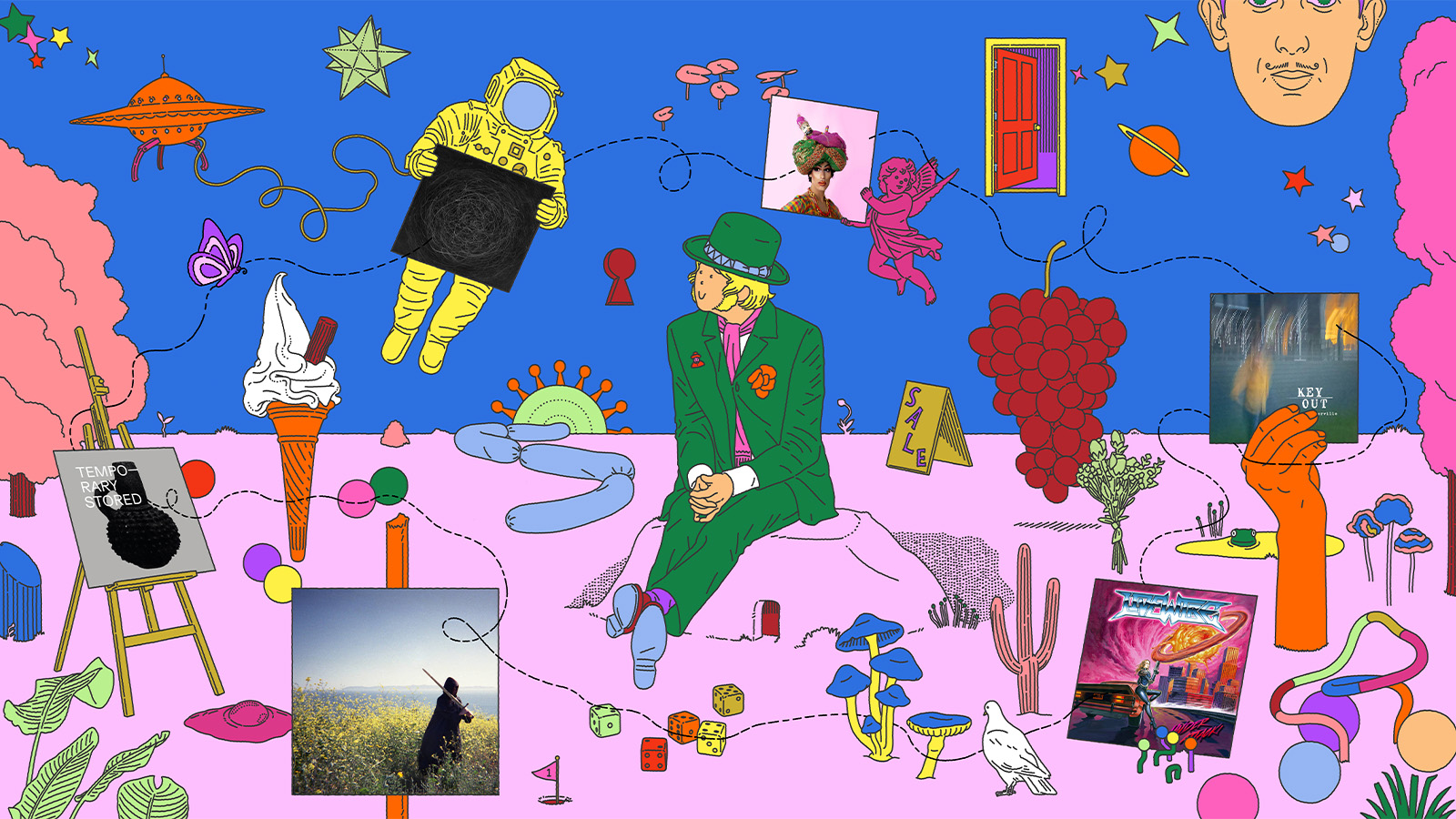
Time keeps marching on, and where I live that means shorter days and colder temperatures. It’s always seemed weird to me that some kinds of music make more sense as “seasonal” listening, but I’m not going to argue with it. It’s autumn in the northern hemisphere, and it’s time to listen to black metal.
Gusforladt
Friendship, Love and War

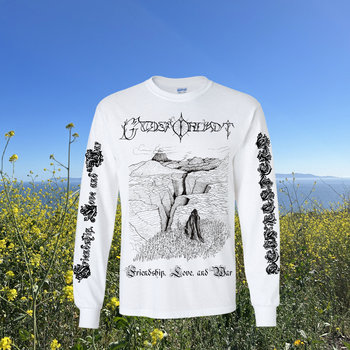



T-Shirt/Shirt, Cassette



This is the second full-length from Massachusetts one-person black metal project Gudsforladt. On Friendship, Love and War, their sound has evolved. The project’s early work was rawer and often slower paced. Here, the tempos are faster and there are similarities to Bathory’s classic Blood Fire Death (in the use of lighter instrumental passages that offer respite from the onslaught). There’s also a greater focus on melody at work here. Standout track “The Criminal and His Willing Sacrifice in Repentance” features a guitar line that was stuck in my head for days after just one listen. Gudsforladt brings in some excellent galloping riffs this time around as well, like the “Barracuda”-esque one that shows up about a minute into “Heads Bowed in Silent Prayer.” In a discography filled with impressive work, this album is a great leap forward.
No big surprise seeing the #metal tag here. It’d be weird if it wasn’t. If you’re in the southern hemisphere, this next one’s for you. It’s still metal but it’s more suited for your approaching summer.
Livewire
Under Attack!

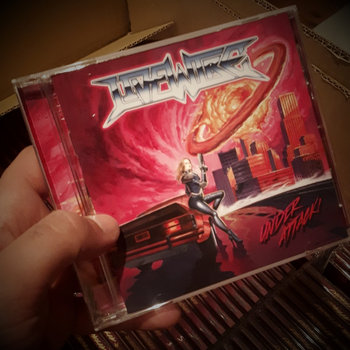

Compact Disc (CD)

Brace yourself, because the debut album from Australia’s Livewire (although they did release one album in 2016 under their previous name of Fenrir) starts off fast and strong and does not let up. This is pure speed metal in the Attacker/Liege Lord/Agent Steel vein. The production’s a little smoother than on those classics, but it’s the 21st century, so some additional polish is to be expected. The blistering twin guitar attack of Christopher Puglia and Anthony Ierardo is stunning. Regardless of how many times they do it, I never get tired of hearing both guitars chugging along in unison at breakneck speed only to have one break away and leap into a soaring solo. Vocalist/bassist Nick Wilks is more than capable here as well, easily slipping into the high vocal register that this type of speed metal all but requires. For a good intro, check out the third track “Conqueror.” It opens with a riff that combines speed metal with thrash and early power metal, relentlessly forging ahead. There are faster songs on the album, but this one packs undeniable power.
Based in #Sydney, Livewire make their home in a town that’s a not-infrequent stop for our travels. That makes sense because that town is crawling with musical acts of all genres, allowing us to stay there for a while longer as we make the jump from metal to an act that’s a bit more subdued.
Key Out
afterville




Vinyl LP


Sometimes, and I’ve definitely dipped into this metaphor before, the way a record sounds reminds me of the light at a certain time of day. The latest from Key Out, afterville, is definitely a sunset record—not like a Sunday evening one that makes you feel all bummed out about how you’ve wasted your weekend and you have to go to work in the morning, but an exciting one, one that follows a great day and one that you know is going to lead to an equally good night. It’s easy to imagine listening to this while driving with the windows down, twilight air blowing in your face. That’s a bit florid, but the music here warrants it. Musically, it’s remarkably similar to (though, to be clear, distinct from) the work of Ultra Vivid Scene, with low-key vocals nestled among strident guitars and metronomic drumming. Vocalist/synthesist Caroline Wake’s voice has a way of sliding in and out of the mix on the choruses. On “small” that voice is haunting, floating in and out like an apparition. Although an overall laid-back affair, this record is somehow energizing—the sound of hope for what’s to come.
Key Out uses the sprawling #alternative tag, one into which, I’m willing to bet, a large percentage of the music on Bandcamp could be placed without too much critical argument. It’s a good tag to use to reset our tag-hopping journey from Australian indie pop to Kenyan hip-hop.
Omwega
UP


On rapper Omwega’s latest, the backing tracks are simple. Synths and trap-influenced drum machines are all you hear. On “Stuck,” the synth sounds veer close to chiptune territory as the beat skitters beneath. It’s the perfect backing, because the action on this five-track EP is all in the lyrics. Omwega has a smooth flow, syllables lazily cascading over the beats. His style is similar to what you might expect from the Atlanta scene that gave the world Migos and Young Thug. But Omwega is no carbon copy. The simplicity of his arrangements give him no place to hide. If his lyricism wasn’t sharp, it would be instantly obvious. On “Take,” a warbling horn line and booming bassline support him as he raps “Don’t brag what you don’t got/ Stuck in the same spot/ Fakes and the snakes I put them in the same pot.” It’s no idle boast. UP is filled with standard rap self-aggrandizement, but Omwega has more than proven that he has the skills to back up the swagger.
#Nairobi is a nexus of a huge amount of musical genres. Digging through that tag you can find reggae, R&B, rock, taarab, and, from our next artist, experimental ambient.
KMRU
Temporary Stored
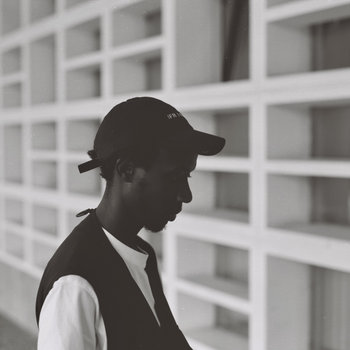



Cassette


The second track of Kenyan ambient artist KMRU’s latest album “MR1” starts off in a way that is similar to The Orb’s “Into the Fourth Dimension,” one of the more abstract pieces on The Orb’s Adventures Beyond the Ultraworld. The elements are all there—looped samples of people speaking, field recordings, a mix that rushes from left to right in a way that is almost dizzying if you’re listening in headphones—but KMRU’s work slowly, subtly, begins to change this formula. Instead of staying low-key, floaty, and mesmerizing, it slowly adds more, louder sounds to the mix, causing one’s mind to have to do a little work to keep up. It’s, frankly, exhilarating in a way that ambient music, usually by intent, rarely achieves. That’s the theme for all of the tracks on this spectacular album. The elements of these songs—chants, rumbling synths, news reports, the occasional kalimba—all vie for center stage. Somehow, it’s never chaotic. KMRU is adept enough at his craft to ensure that the components of his work are never fighting each other for attention. Rather, they’re all boldly asserting themselves and working together to create a result greater than its parts—an album that is fresh, mysterious, and infinitely compelling.
The #ambient tag allows us to move nearly 5000 miles across the Arabian sea to Sri Lanka, where we find our next artist, an experimental musician mixing improvisational electronics with field recordings.
Isuru Kumarasinghe
Floating Ball


Beginning with the sharp jolt of a switch being thrown, Floating Ball is an album about power. Electrical power is represented in the low industrial thrum that resurfaces from time to time through these tracks, but there’s also mechanical power (a field recording of a busy street), the power of communication represented by the almost but not quite intelligible snippets of voices in conversation, and power in the form of intensity—the expert way that Isuru Kumarasinghe layers these disparate pieces of sound on top of one another. This creates a sort of musical mass that grows, especially on the forceful ending of “That butterfly in the Chest,” almost to the point of becoming overwhelming, but stops just short, subsiding into a sparkling, peaceful chord that gradually fades away. The dynamics at work on this album are beyond impressive—sounds and samples are deftly selected and balanced, creating an eerie, sometimes unnerving work that ultimately provides us with peace in the midst of chaos.
The #South Asian tag covers quite a bit of ground both literally and, as is the case with our next artist, culturally. We’re moving from Sri Lanka to Montréal now to check in with a drag performer focusing on her South Asian heritage to make playful pop music.
Bijuriya
Bijuriya Chamke


Bijuriya is a Montréal-based drag performer who, according to her Bandcamp page, is “appreciated for her proud, festive, wacky, and critical outlook on Bollywood and other elements of Desi culture.” Lyrically, the sense of camp, humor, and fun that is the heart of drag is abundantly evident here. But for the most part, “comedy” songs don’t work if the music doesn’t make you want to stick around for the jokes. On this album, Bijuriya worked with Gabriel Ledoux to create a candy-coated pop album through which run sonic elements of the South Asian culture that she celebrates and caricatures. On “How Many Ks,” a track satirizing Bollywood’s seeming obsession with that titular letter, Bijuriya’s rhymes are framed by a staccato melody with a shimmering wall of synths coming through on the chorus. Album closer “Geeta” uses strings, deep bass voices and a slower pace to close things down in a somber, contemplative mood. Rather than spoiling the light-hearted, fun mood of the preceding tracks, it’s a fitting close to the album; a reflective ending that exposes one more shining facet of Bijuriya’s character.
Let’s stay in #Montréal for a while. In the ‘90s I got lost in that beautiful city. I followed a crowd of punk kids into an underground performance space and saw three bands play. I still have no idea who those bands were. But that’s not important right now. What is important is a much more identifiable Montréal musician on our next featured work.
Halde
The Flow


Compact Disc (CD)



I’m not knowledgeable about the actual playing of synthesizers so I don’t know how to describe this effectively, but there’s a synth sound that opens “Circles,” the first song on this album. It has a deeply nostalgic tone. Anyone of a certain age who’s watched educational programming from the ‘70s and early ‘80s will immediately recognize its sound—kind of like a “WOW” noise. That’s what grabbed me and got me to stick around for the remainder of the record, and I am really glad I did. Halde has an amazing ear for melody. Every track on this record has a tune that sticks with you long after the song has faded, and the voice that delivers these melodies is rich, emotional, and flexible. But it’s not just about the voice—Halde’s band knows their way around a pop song. Check out the bass-heavy groove midway through “Something Left to Save.” It’s phenomenal. On “Pictures of Mountains,” Halde sings “There’s a song that’s been stuck in my head, and I sing it to the void.” I don’t know where you’re going to be singing these songs, but they’re definitely going to get stuck in there.
The #indie tag is another big one, allowing us to jump from French Canadian pop to Lithuanian folk punk.
For the Sake of Brevity
Ghost Towns

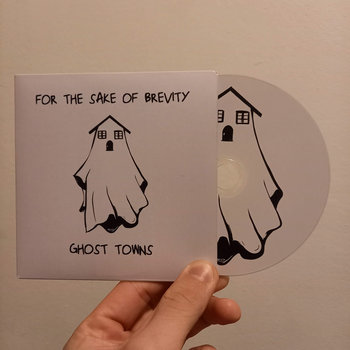
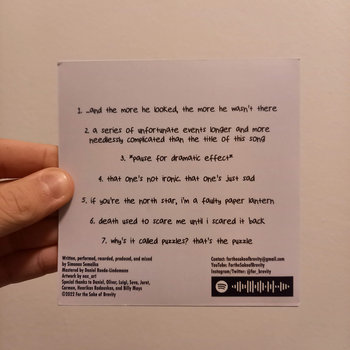
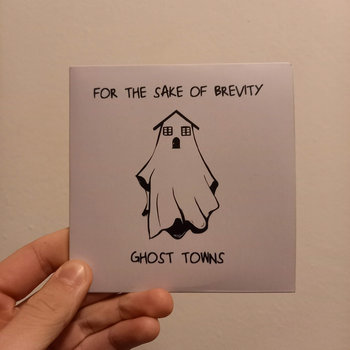

Compact Disc (CD)



Lithuanian one-person band For the Sake of Brevity combines the “coffee-house” folk style with the sound of folk punk bands like Martha or Defiance, Ohio. Sole member Jonas Semaška’s voice is raw and honest and is sonically placed at the forefront of the mix here, along with his acoustic guitar. The remainder of the accompaniment—drums, bass, the occasional synth—is recorded at a slightly lower volume, leaving the spotlight just on the words and the melody (although, to be clear, Jonas did everything you hear). The folk/pop-punk influences are especially felt in this album’s combination of generally upbeat music with introspective, plaintive lyrics. On “*Pause for Dramatic Effect*,” Semaska uses the classic Midwest emo trick of having a sustained vocal note held through the chorus, and it sounds great. The standout track here is “If You’re the North Star, I’m a Faulty Paper Lantern,” which begins simply and builds to an anthemic crescendo, but the album as a whole is a pleasant surprise—intimate, personal, and captivating.
Lithuania’s largest city #Vilnius is known for its architecture and its rich cultural history. It’s also where we’ll find our final featured artist this time around.
Shishi
Nearly Happily Ever After

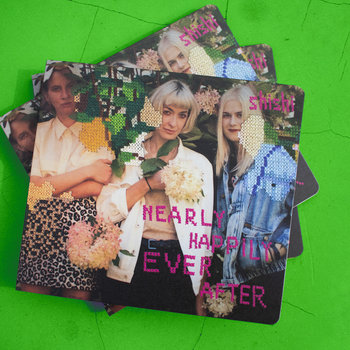
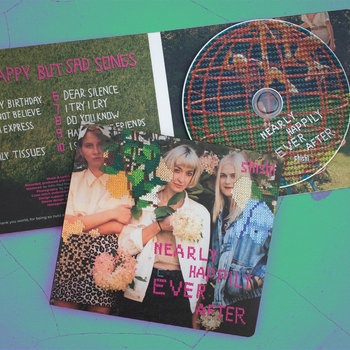
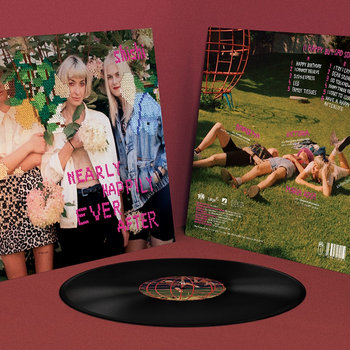

Compact Disc (CD), Vinyl LP



Right at the start, it should be noted that this album’s opening track “Happy Birthday” is the most upbeat and infectious song to ever include the lyric “Your dog puked on the carpet.” That should be enough to get you to click play here, but don’t worry, the rest of the record absolutely lives up to that bold opening. This is a deeply weird record, but the weirdness is hidden under pop/funk-influenced grooves (think ESG, early B-52s, or a lower-fidelity Tom Tom Club) and some of the catchiest melodies I’ve heard in recent memory. Throughout the album, I kept being reminded of Throwing Muses, not because this band sounds terribly similar to them, but there’s something about the combination of lyrical abstraction and tight songcraft that kept guiding my brain back there. Check out the surf-influenced “Sushi Express” and you’ll probably hear it. On “Dear Silence” there are some acrobatic vocal harmonies that give you a taste of what The Roches might would have sounded like if they wanted to make dance music. This combination with off-center experimentalism and sharp pop hooks makes this record an absolute joy.
And there’s one more trip (mostly) around the world through Bandcamp’s tags. As always, thanks for coming along (I almost wrote “tagging along” but that is a very bad joke and one that I will not allow myself to make—even though I guess I just did) and I sincerely hope you found something you love or at least an idea of how to look for it. It’s out there, I know it.








